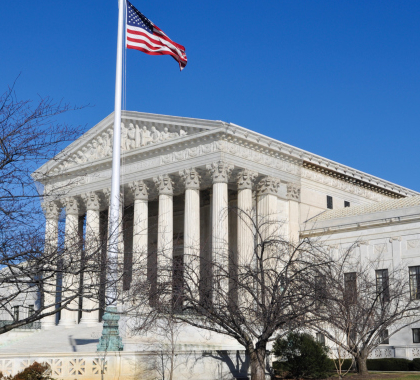The U.S. Supreme Court (SCOTUS) has ordered a lower court to reconsider a North Dakota case challenging mandatory attorney bar fees in light of its Janus ruling on public employees’ First Amendment rights.
On December 3, 2018, SCOTUS ordered the Eighth Circuit Court of Appeals to reconsider its 2017 decision in the case, Fleck v. Wetch, following SCOTUS’s decision in Janus v. American Federation of State, County, and Municipal Employees.
In its June 27, 2018 Janus decision, SCOTUS affirmed the right of individual government employees to choose whether or not they want to become members of public labor unions and contribute dues and fees to them. The suit was brought by Illinois Department of Healthcare and Family Services Child Support Specialist Mark Janus.
‘You Have to Join’
In 2015, North Dakota lawyer Arnold Fleck sued to overturn a state law that requires all attorneys in the state, after they pass the bar exam, to pay fees to the State Bar Association of North Dakota. Fleck claimed the association uses the dues to fund political activities he does not support, including funding political campaigns, in violation of his First Amendment rights.
Lawyers should be able to choose whether they want to join and pay fees to a private bar association, says Jeffrey Schwab, senior attorney with the Liberty Justice Center, which represented Mark Janus in his case.
“If you want to be a lawyer in North Dakota, you have to join a private bar association. You have to pay money to them, and they basically make political statements and lobby,” Schwab said.
“Under the laws in North Dakota, however, most lawyers likely won’t even know what they’ve gotten into,” said Schwab. “They will do what the default is because it’s easy. They might not even know that they’re funding what they’re funding.”
First Amendment Rights
A federal district court and the Eighth Circuit Court of Appeals ruled against Fleck in 2017. The Goldwater Institute petitioned the U.S. Supreme Court to consider whether the bar association laws in North Dakota adhere to the Janus ruling.
Timothy Sandefur, vice president for litigation at the Goldwater Institute, says compelling lawyers to fund state bar associations sometimes means their money supports political beliefs they do not hold.
“The First Amendment guarantees freedom of speech and freedom of association. You can’t be required to subsidize political opinions you disagree with,” Sandefur said.
Applying Precedents
Fleck v. Wetch will have another hearing at the Eighth Circuit Court, says Sandefur, because lower courts cannot assume their opinions are invalidated due to a U.S. Supreme Court ruling.
“The next step would be for the Court of Appeals to order another round of briefing and probably oral arguments on how the Janus case affects their views,” Sandefur said.
Under current law, North Dakota lawyers who pass the bar must choose to leave the association. “We had argued before Janus was decided that the constitution requires an opt in [to membership and dues],” said Sandefur
Sandefur says opt in is the only constitutional route, but the Eighth Circuit Court must apply its existing precedent and decide whether or not to overrule its own decision.
The Eighth Circuit Court may find that opt in is only required for labor unions, Sandefur says. In that situation, the Fleck case would probably go to the U.S. Supreme Court for another hearing and Sandefur says they would argue again that the mandatory bar fees violates the First Amendment freedom of speech and association.
Nolan Ryan ([email protected]) writes from Hillsdale, Michigan.
Internet Info
Leo Pusateri, “Supreme Court Favors Workers in Forced Union Dues Case,” News & Opinion, The Heartland Institute, July 12, 2018:
https://heartland.org/news-opinion/news/supreme-court-favors-workers-in-forced-union-dues-case




